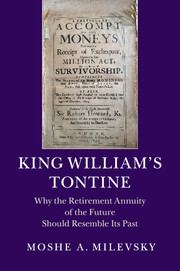Book contents
- Frontmatter
- Epigraph
- Contents
- Preface: In Memoriam for Jared
- Acknowledgments
- 1 King Billy, Protestant Hero of england
- 2 Tontine's Economic Origins: Cheaper Debt
- 3 A Most Curious Will(iam) and Older Than You Think
- 4 The Million Act to Fight a War against France
- 5 Don't Englishmen Die? Anti-Selection vs. Fraud
- 6 Is Your Tontine a Stock or a Bond?
- 7 Optimal Tontine: Hedging (Some) Longevity Risk
- 8 Conclusion: Tontines for the Twenty-First Century
- Epilogue: What Did William Really Know?
- Appendix A The List of Nominees
- Appendix B The Gompertz-Makeham Law of Mortality
- Appendix C 14% for One, 12% for Two, or 10% for Three?
- Source Notes and Guide to Further Reading
- References
- Index
5 - Don't Englishmen Die? Anti-Selection vs. Fraud
Published online by Cambridge University Press: 05 May 2015
- Frontmatter
- Epigraph
- Contents
- Preface: In Memoriam for Jared
- Acknowledgments
- 1 King Billy, Protestant Hero of england
- 2 Tontine's Economic Origins: Cheaper Debt
- 3 A Most Curious Will(iam) and Older Than You Think
- 4 The Million Act to Fight a War against France
- 5 Don't Englishmen Die? Anti-Selection vs. Fraud
- 6 Is Your Tontine a Stock or a Bond?
- 7 Optimal Tontine: Hedging (Some) Longevity Risk
- 8 Conclusion: Tontines for the Twenty-First Century
- Epilogue: What Did William Really Know?
- Appendix A The List of Nominees
- Appendix B The Gompertz-Makeham Law of Mortality
- Appendix C 14% for One, 12% for Two, or 10% for Three?
- Source Notes and Guide to Further Reading
- References
- Index
Summary
TONTINE CRIMES IN LITERARY FICTION
In 1718, in the City of London, while the mania around the South Sea Company was unfolding and every stockholder was dreaming of getting rich, a lawyer by the name of Mr. Woollaston was concerned about another matter completely. His fear was that not enough tontine nominees were dying. Let me repeat. The nominees were not dying fast enough for his taste! He published a pamphlet, which I'll return to later, in which he complained: “Don't Englishmen Die?”
The common perception or fear – at least among people who have heard of them – is that tontines were banned in Britain and the United States because of the incentives to murder other participants and nominees. Moreover, famous novelists and Hollywood writers have done much to advance this erroneous thesis about the risk of tontines.
Novels and Movies about Tontines
One of the best-known novels – which then became a movie – involving tontines is The Wrong Box. It was cowritten by the noted Scottish author Robert L. Stevenson (1850–1894) and Samuel L. Osbourne (1868–1947), who was an American author (and Stevenson's stepson). The story is about an extreme tontine scheme where the last survivor wins the entire fortune, quite different from the one I will advocate (in Chapter 7), in which survivors share ever-shrinking dividends.
The Wrong Box begins toward the very end of the scheme when there are only two surviving members left – each waiting for the other to die, of course. They also happen to be brothers. The comedy (tragedy) revolves around the grandchildren of the tontine (nominee) who are desperately trying to keep one of the brothers alive so they can inherit the tontine funds, while the other brother is trying to kill him. It gets messy, people disappear, and others fall in love. This is a complicated and clever book, which became even more popular when it became the basis of a movie (in 1966) starring Michael Caine, Dudley Moore, and Peter Sellers (yes, all in one movie!).
- Type
- Chapter
- Information
- King William's TontineWhy the Retirement Annuity of the Future Should Resemble its Past, pp. 80 - 113Publisher: Cambridge University PressPrint publication year: 2015



